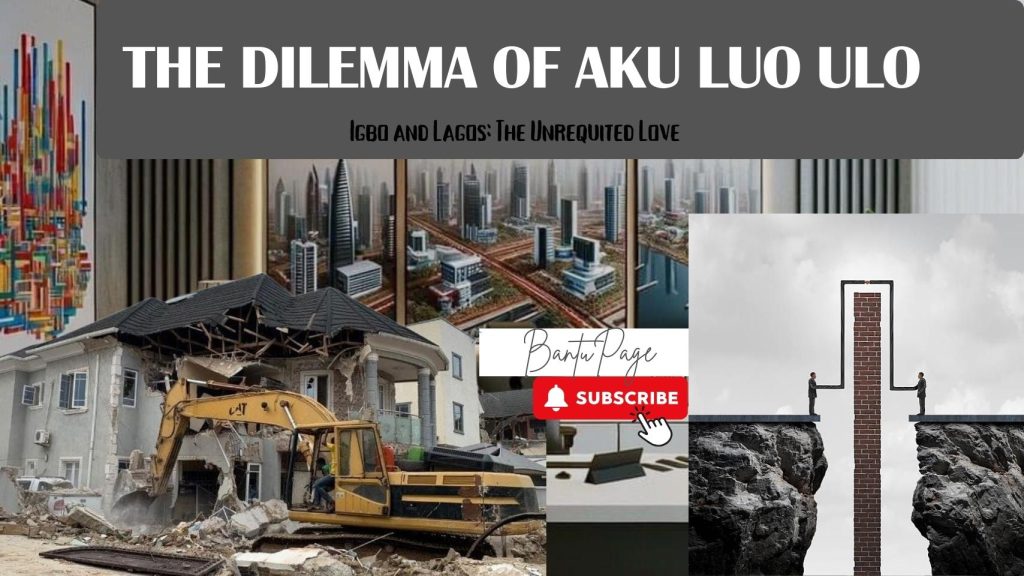
Igbo and Lagos: The Unrequited Love
“Do not invest in Lagos.”
Imagine stepping into the office of a businessperson and staring back at you, is a modern painting with some unfailingly noticeable word depictions. Undoubtedly, the painting was intentional; they wanted it to be seen and tell a story. Could their ethnicity be deduced from the painting? Are they a person of their word? Could they uphold this decision until the last breath?
Aku luo ulo is an Igbo philosophy that says, “Wealth only matters when brought home.” It reinforces the adage “Charity begins at home,” or, if broadened, beyond one’s family and friends. Lagos, a city in the southwestern part of Nigeria, it is the largest city in Africa by population. On the other hand, Ndi Igbo comprises most people from the Southeast and a minority from the south-central part of Nigeria.
According to history, the Ndi Igbo settlement in Yorubaland dates back to the 15th century, during the inter-community trade between the Benin and Aro people of Igbo descent and their contact with the Portuguese. As a result of the trade that fostered togetherness, they occupied a place called Oyingbo in the current part of Lagos Mainland. Hence, the current Igbo permeation in the place and other parts of the state. Recently, there has been an ongoing demolition of properties in Lagos State by the state government and the Federal Housing Authority.
Allegedly, most of the demolished buildings were Igbo-owned. The claim for a selective demolition is inevitable. The Lagos Ministry of Environment and Water Resources claimed that these were illegal structures that had caused poor drainage in the areas. The obvious question is, where were the Lagos State Ministry of Environment and the Urban Planning and Development Committee? As the body in charge, should they not have stopped the structures in the first place? How does selective demolition tackle Lagos’s poor drainage systems? Nowhere in Lagos is sparred of poor drainage, even in Ikoyi. Why is everywhere not flattened to sort out Lagos’ drainage system as a whole?
The fate of the Igboman in Lagos is like that of an unrequited love. The Ndi Igbo presence in Lagos has contributed immensely to the region’s socio-economic growth. These people championed a more significant percentage of development in Lagos. It is essential to point out that the Igbo investment in Lagos is individualistic and wholly based on the private sector. In other words, the hard work of the Ndi Igbo is without support from the state or federal government. Lagos’ port is the heart of Nigeria. It is the only fully functional port, and its revenue propels Lagos’ economy immensely.
Did you know that 65% of all the containers coming through Lagos end up in the Southeast? If so, it could also be argued that the 35% that stays in Lagos and other parts of Nigeria bear Ndi Igbo ownership significantly, thus concluding that the Ndi Igbo’s “The dot in the circle” contribution to Lagos and Nigeria is unprecedented. Onyeka Onwenu narrated in her memoir that one of the implications of the Nigeria-Biafra War was the deviation from communalism to individualism among Ndi Igbo. This transition led to their dispersal to various parts of the country, sprouting multiple seeds with a meagre twenty pounds.
After the war, General Chukwuemeka Odumegwu Ojukwu, after his experience fleeing and subsequent asylum in Côte d’Ivoire, stated that in the end, Igbos would regret all the investments poured into Lagos State because, in a matter of time, with just a pen through one piece of legislation, they could all be written off. From the ongoing demolitions, it would seem Ojukwu’s prediction is coming to fruition.
Well-intentioned Ndi Igbo and nation-builders have transformed the aku luo ulo philosophy into a movement. Some who are yet to be converted or reoriented are left pondering. Has the Igboman overstayed his welcome in Lagos? Will the Igbo transfer their business and investment to the Southeast or continue the unrequited Lagos affair?
By Chidimma NWAFOR





